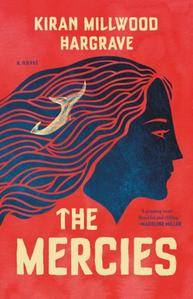
 The Mercies is a dread-soaked retelling of real events that sets itself apart with an unusual premise and setting. Kiran Millwood Hargrave, an acclaimed children's book author in the U.K. (The Girl of Ink and Stars), makes her adult debut with a historical novel based on calamitous events at the far-flung town of Vardø in northern Norway. In 1617, a storm surprises 40 fishermen at sea, killing the majority of the town's male population. The women are left to fend for themselves, the harshness of their situation demanding that they put aside their grief and fulfill roles typically reserved for men if they want to survive. Besides its basis in history, the premise opens up fascinating questions about how women respond when the patriarchal structures they were born into collapse around them. The Mercies demonstrates faith in women's toughness and adaptability, but takes a clear-eyed view of how the old ways violently reassert themselves.
The Mercies is a dread-soaked retelling of real events that sets itself apart with an unusual premise and setting. Kiran Millwood Hargrave, an acclaimed children's book author in the U.K. (The Girl of Ink and Stars), makes her adult debut with a historical novel based on calamitous events at the far-flung town of Vardø in northern Norway. In 1617, a storm surprises 40 fishermen at sea, killing the majority of the town's male population. The women are left to fend for themselves, the harshness of their situation demanding that they put aside their grief and fulfill roles typically reserved for men if they want to survive. Besides its basis in history, the premise opens up fascinating questions about how women respond when the patriarchal structures they were born into collapse around them. The Mercies demonstrates faith in women's toughness and adaptability, but takes a clear-eyed view of how the old ways violently reassert themselves.
One protagonist is Maren, a young woman who loses as much as anyone else in the storm: a brother, father and her husband-to-be. When the town divides after the storm, she finds herself drawn toward Kirsten, who confidently flouts gender norms, and away from the more conservative women. Hargrave portrays Vardø as a town on the edge of everything, where rigid Christian strictures have not yet been fully enforced. The town's remoteness has offered a degree of freedom to the women there, a freedom that will soon be challenged by the arrival of commissioner--and witch-hunter--Absalom Cornet. His arrival represents an assertion of state and church authority over what Absalom sees as a wild, devilish place.
Absalom brings his new wife, Ursa, who is far from prepared for the harshness of Vardø. The Mercies is, in part, about how repression and power imbalances function at different levels. Ursa's experience of marriage is a painful one, and her fear of her husband only deepens as the book goes on. She finds small pockets of freedom where she can, including in an increasingly intimate relationship with Maren. The indigenous Sámi people are caught in the wave of repression, and Maren's widowed sister-in-law, an unapologetic Sámi woman, becomes a target of suspicion. The Mercies shows the worst side of state formation: conformity crushing a formerly individualistic, even somewhat pluralistic, society. Hargrave does not provide a simplistic feminist parable: prejudice, suspicion and petty grievances set the women against each other almost immediately after the men die. When Cornet arrives, he accelerates these conflicts toward a violent end.
For all the novel's outer grimness, it finds a warm heart in the relationship between Maren and Ursa. What starts out as an awkward, transactional arrangement between the two--Ursa pays Maren to help her learn necessary household duties--quickly develops into something more. They find refuge in each other, especially as tensions escalate in Vardø. As the promise of a matriarchal society fades and survival once again becomes preeminent, the bond between the two women strengthens. By the novel's bloody end, they are the only spark of hope left. --Hank Stephenson, manuscript reader, the Sun magazine
Shelf Talker: The Mercies draws from an extraordinary incident in 1617, when almost the entire male population of a tiny Norwegian town was killed, to meditate on patriarchy, oppression and love.

